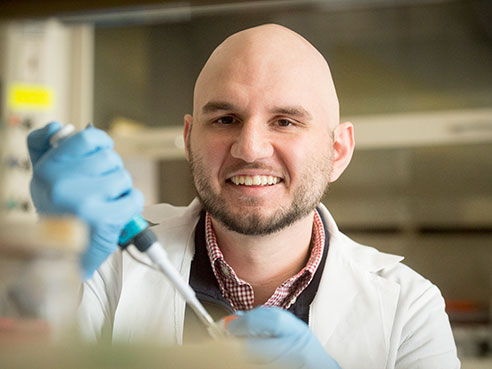 Stephen Moore knew nothing about dermatomyositis in the fall of 2012. It’s a rare autoimmune disease, and Moore, a 25-year-old college student, had never heard of it.
Stephen Moore knew nothing about dermatomyositis in the fall of 2012. It’s a rare autoimmune disease, and Moore, a 25-year-old college student, had never heard of it.He knows a lot about it now. Currently a graduate student in neuroscience at the University of Alabama at Birmingham, Moore first experienced symptoms in early 2012. The formal diagnosis of dermatomyositis was confirmed that September.
“At first, I couldn’t even pronounce the illness, let alone fully comprehend what this meant in terms of my health and well-being,” Moore said.
It is an inflammatory condition that attacks connective tissue and muscle, causing fatigue and weight loss, and often leads to a severe rash on the hands and torso. There’s no cure, nor any real idea of what causes dermatomyositis. It affects about five of every million people.
It can also affect organs — Ricky Bell, the No. 1 NFL draft pick in 1977, died of heart failure related to dermatomyositis at age 29. The five-year survival rate is about 75 percent, and 10-year survival is more than 50 percent, according to one study. About 25 percent of patients go into remission.
For Moore, the disease caused extreme fatigue and weakness. He lost 40 pounds and spent more time than he likes to remember in hospitals. Treatment is different for each patient, and finding the right combination of therapeutics can be something of a guessing game. Moore’s medical team has tried nearly 30 medications since his diagnosis, and he is currently on 11.
| “To this day, it is still a constant learning process with new treatment plans; but I knew that, if I kept a positive attitude and outlook, good things would come. I knew I had this great support team of family, friends and classmates that really helped me find my new self. This has pushed me to help others in need who have been affected by neuromuscular illness.” |
A budding scientist, Moore is meticulous in his recordkeeping. He has a binder — some 3 inches thick and growing — with every medical report and scrap of information he has gathered on dermatomyositis. It is a valuable tool. Knowledge, after all, is power.
“To this day, it is still a constant learning process with new treatment plans; but I knew that, if I kept a positive attitude and outlook, good things would come,” Moore said. “I knew I had this great support team of family, friends and classmates that really helped me find my new self. This has pushed me to help others in need who have been affected by neuromuscular illness.”
From knowledge also comes strength, and Moore is channeling that strength to raise awareness and be a voice for those coping with similar illnesses. He has created Team Strength Through Knowledge, to participate in the Muscular Dystrophy Association Muscle Walk on April 11. He joined MDA after his diagnosis, and says the organization has expressed interest in funding research into connective-tissue diseases. As Moore got involved, he started looking for potential team members to help him.
“Little did I realize, I already had my team in place — the people who supported me from the beginning when I first got sick,” Moore said. “We are all coming together to raise awareness and money to help others in need.”
Moore’s Team Strength Through Knowledge now boasts 11 members, and is backed by UAB Graduate Student Government. Visit histeam page on the MDA website to make a contribution or learn more about dermatomyositis.
While Moore is working on his doctorate at UAB in neuroscience, his own battle with dermatomyositis has piqued his interest in neuromuscular and autoimmune diseases. Living with an autoimmune condition that is so poorly understood has given him a special appreciation for the work going on in research labs all over UAB.
“There are people out there suffering from these very illnesses that we are studying,” he said. “That really gives meaning to our work.”